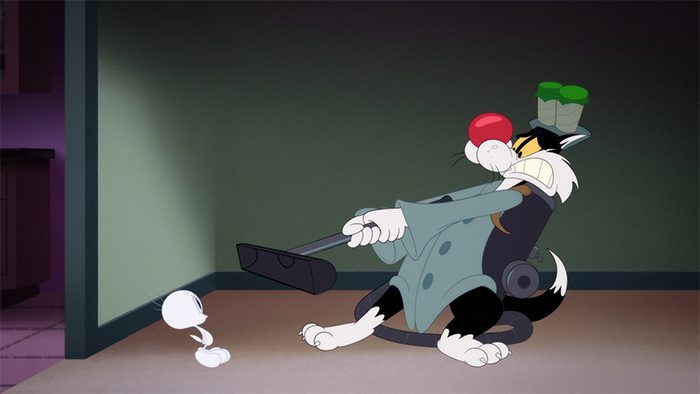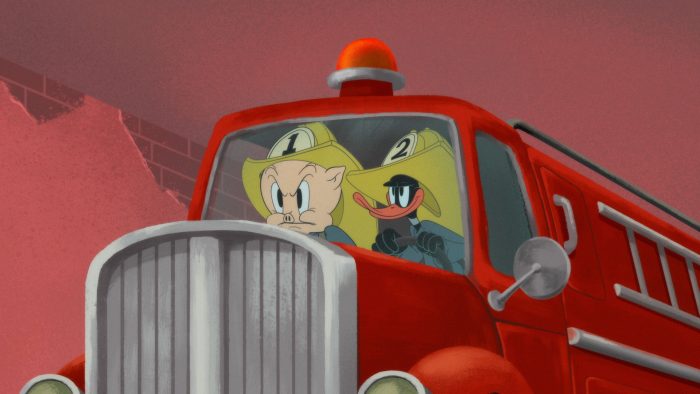HBO Max's New 'Looney Tunes Cartoons' Capture The Comedic Spirit And Style Of The Classic Animated Shorts
There have been several different iterations of Looney Tunes (and by association Merrie Melodies) in recent years that have tried to update the classic cartoon characters with contemporary animation styles and modern day storylines. Unfortunately, the likes of The Looney Tunes Show, New Looney Tunes, and even Tiny Toon Adventures from the 1990s failed to really tap into what was special about the classic animated shorts starring Bugs Bunny, Daffy Duck, Porky Pig, Marvin the Martian, Road Runner, and more.
But when it comes to HBO Max's new Looney Tunes Cartoons, the spirit and style of cartoon comedy from directors like Friz Freleng, Chuck Jones, Tex Avery and more is satisfyingly intact, albeit with a few changes that will take a little time to get used to.
HBO Max provided us with the three episodes of the new Looney Tunes Cartoons that will be available on the streaming service when it launches on May 27. Each episode runs about 11 minutes, comprised of two shorts that run between four and seven minutes, as well as an interstitial short with a quick slapstick gag that runs a little less than a minute. There will be a total of 80 episodes like this available on HBO Max, and the streamer promises special holiday-themed specials in the future.
Right from the beginning, Looney Tunes Cartoons throws it back to the old days by using the instantly recognizable red-orange colored circles to open the show, complete with the face of the character whose cartoon you're about to watch. But the best part of these openings is that the series has updated orchestral versions of the classic compositions that opened the original Looney Tunes. "Merry Go Round Broke Down" by Cliff Friend and Dave Franklin, "What's Up Doc?" by Carl Stalling, and "Merrily We Roll Along" by Eddie Cantor, Murray Mencher and Charles Tobias all get adaptations by Carl Johnson and Joshua Moshier that update the tunes with new recordings but without losing the orchestral zaniness that made them so fun.

But paying homage to the cartoons that came before is easy. What's truly impressive about the new Looney Tunes Cartoons is how they manage to deliver comedy-driven storytelling on the foundation of simple premises. These shorts feel timeless, almost like they were lost in a vault somewhere, waiting to be unearthed when we needed them most. Daffy Duck and Porky Pig go looking for treasure and work as pretty terrible firemen. Bugs Bunny challenges Yosemite Sam to an arm wrestling match in a saloon and strolls into a spooky castle to catch a baseball game on TV. Sylvester the Cat believes he's finally eaten Tweety Bird, and is tricked into thinking he's being haunted by the bird's ghost, but he's really just covered in flour. One of the shorts just focuses on Daffy Duck getting covered in that classic cartoon bright pink bubble gum and comically struggling to free himself. They're brilliant in their simplicity and feel effortlessly brought to life, and they don't rely on shoehorned pop culture references or contemporary storylines. It might seem lazy to tread that familiar territory, but not everything requires forced modernity to thrive in today's culture. Sometimes you don't want bacon-infused, baked veggie straws dipped in gluten free bean dip, you just want some damn potato chips.
The artwork in these new Looney Tunes Cartoons is worth writing home about too. Revived are the old school matte-painting style backgrounds. You know the ones I'm talking about. The images on screen that look like still paintings except for the characters and objects that are about to be animated. The character designs borrow cues from classic designs from way back in the day, such as Bugs Bunny's yellow gloves, or making Daffy Duck's bill being a little more thin and wiggly, enhancing the return of the character's more goofy side rather than the smarmy, sarcastic one from later shorts. Elmer Fudd's nose is a little more red and shiny. However, there are some updates that take some time to get used to.

Some of the new Looney Tunes Cartoons have brief moments where there are influences from the style of more modern cartoons like SpongeBob SquarePants or Ren & Stimpy (which is to be expected when you have some animators and artists who worked on those shows). The latter is especially noticeable in particular one-off character designs or gags where there's an exaggerated and more detailed close-up on a character's sudden injury or unnatural appearance. The characters also seem to be a little more fluid in their cartoon movement, which may just be a result of the ease with which characters can be animated in a computer as opposed to being painstakingly drawn frame by frame. Furthermore, some of the updated character designs can be a challenge to overcome. For example, the new iteration of Sylvester the Cat has yellow eyes and a more bulbous red nose, making him look a little more sinister than his classic iteration.
Another element of the new Looney Tunes Cartoons that is a bit of a hurdle, at least if you're a fan of the original characters, are the voices for the characters. Eric Bauza voices Bugs Bunny, Daffy Duck, Martin the Martian and Tweety Bird; Jeff Bergman tackles Elmer Fudd, Sylvester the Cat, and Ralph Wolf; Bob Bergen brings in Porky Pig; Fred Tatasciore is in charge of Yosemite Sam, Gossamer and Sam Sheepdog; Candi Milo is Granny; and Michael Ruocco is Beaky Buzzard. Not all of these characters were seen in the three preview episodes I saw, but the ones that were feature admirable voice work by the respective actors, but they're just slightly off from the work of Mel Blanc and the rest of the gang who brought those classic versions of the characters to life. Even so, each of the actors does a good job following in the footsteps of legends.
The good news is after you spend time with the few updated artistic touches and the new voices, you realize just how perfectly in tune these new shorts are with the classic feel of Looney Tunes, and the more noticeable updates aren't nearly as cumbersome as they might seem at first. What initially made me weary eventually became more than acceptable, and I was a kid all over again while watching these cartoons. All-in-all, executive producers and Pete Browngardt and Sam Register have done a fantastic job of bringing these beloved characters back into the pop culture spotlight without sacrificing what made them the classic cartoons that audiences of all ages have loved for decades. The new Looney Tunes Cartoons can be enjoyed by nostalgic adults who want to feel like kids and today's children will get a laugh out of some silly slapstick schtick too.
Check out the new Looney Tunes Cartoons when they arrive with the launch of HBO Max on May 27.
